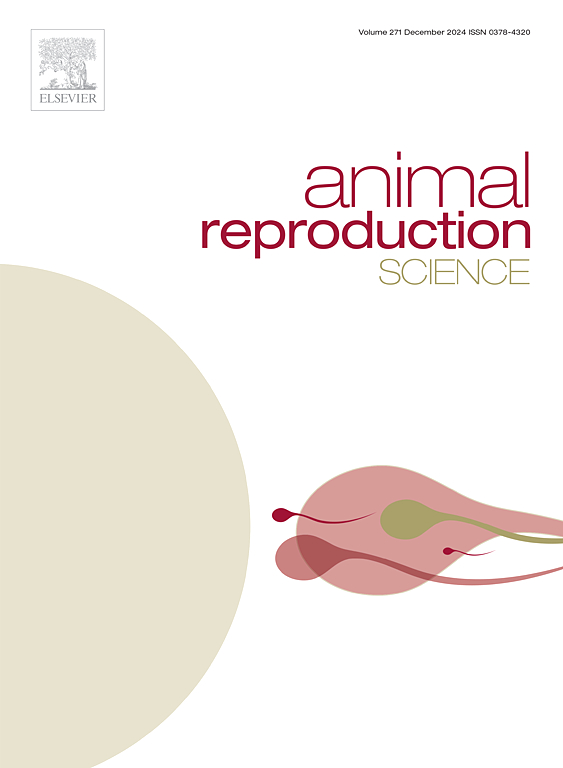体外成熟过程中补充白血病抑制因子可促进牛卵母细胞成熟和体细胞克隆胚胎发育
IF 3.3
2区 农林科学
Q1 AGRICULTURE, DAIRY & ANIMAL SCIENCE
引用次数: 0
摘要
体细胞核移植(SCNT)在动物生殖和基因工程,特别是高产奶牛育种中起着至关重要的作用。然而,SCNT技术的应用面临着许多挑战,特别是在体外成熟阶段效率低,流产率高。这些问题导致克隆胚胎着床率降低,影响整体生殖效率。因此,提高体外成熟培养基的质量已成为提高体外生产效率的重要途径。本研究旨在探讨白血病抑制因子(leukemia inhibitory factor, LIF)对牛卵母细胞成熟及克隆胚胎着床率的影响。通过在成熟培养基中添加25 ng/mL的LIF,我们观察到卵母细胞成熟率显著增加。随后,我们使用liff处理的卵母细胞生成SCNT胚胎,并进行了激活和培养实验。结果表明,LIF可增强SCNT胚胎的分化能力,并在胚胎早期发育过程中发挥抗凋亡作用。具体来说,补充LIF不仅提高了卵母细胞的核成熟率,还增强了细胞质成熟特征,如线粒体膜电位和内质网分布。此外,经liff处理的卵母细胞在SCNT胚胎中表现出更高的细胞数量和更低的凋亡率,表明它在胚胎质量控制中起着至关重要的作用。最终,我们发现LIF显著提高了克隆胚胎的着床效率,特别是在胚胎移植后的妊娠早期。这一发现为提高SCNT技术的成功率提供了新的见解,并为未来的研究,特别是探索其他生长因子和细胞因子对卵母细胞成熟和胚胎发育的影响奠定了基础。本文章由计算机程序翻译,如有差异,请以英文原文为准。
Leukemia inhibitory factor supplementation during in vitro maturation enhances bovine oocyte maturation and somatic cloned embryo development
Somatic cell nuclear transfer (SCNT) plays a crucial role in animal reproduction and genetic engineering, especially in the breeding of high-yield dairy cows. However, the application of SCNT technology faces numerous challenges, particularly the low efficiency and high abortion rates during the in vitro maturation phase. These issues lead to reduced implantation rates of cloned embryos, affecting overall reproductive efficiency. Therefore, enhancing the quality of in vitro maturation media has become an essential approach to improve in vitro production efficiency. This study aimed to investigate the effects of leukemia inhibitory factor (LIF) on bovine oocyte maturation and cloned embryo implantation rates. We observed a significant increase in oocyte maturation rates by supplementing 25 ng/mL LIF into the maturation medium. Subsequently, we generated SCNT embryos using LIF-treated oocytes and conducted activation and culture experiments. The results indicated that LIF could enhance the differentiation capabilities of SCNT embryos and exert an anti-apoptotic effect during early embryonic development. Specifically, the supplementation of LIF not only improved the nuclear maturation rates of oocytes but also enhanced cytoplasmic maturation characteristics, such as mitochondrial membrane potential and endoplasmic reticulum distribution. Furthermore, LIF-treated oocytes exhibited higher cell numbers and lower apoptosis rates in SCNT embryos, indicating its crucial role in embryo quality control. Ultimately, we found that LIF significantly improved the implantation efficiency of cloned embryos, particularly during the early stages of pregnancy following embryo transfer. This finding provides new insights into improving the success rates of SCNT technology and lays the groundwork for future research, especially in exploring the effects of other growth factors and cytokines on oocyte maturation and embryo development.
求助全文
通过发布文献求助,成功后即可免费获取论文全文。
去求助
来源期刊

Animal Reproduction Science
农林科学-奶制品与动物科学
CiteScore
4.50
自引率
9.10%
发文量
136
审稿时长
54 days
期刊介绍:
Animal Reproduction Science publishes results from studies relating to reproduction and fertility in animals. This includes both fundamental research and applied studies, including management practices that increase our understanding of the biology and manipulation of reproduction. Manuscripts should go into depth in the mechanisms involved in the research reported, rather than a give a mere description of findings. The focus is on animals that are useful to humans including food- and fibre-producing; companion/recreational; captive; and endangered species including zoo animals, but excluding laboratory animals unless the results of the study provide new information that impacts the basic understanding of the biology or manipulation of reproduction.
The journal''s scope includes the study of reproductive physiology and endocrinology, reproductive cycles, natural and artificial control of reproduction, preservation and use of gametes and embryos, pregnancy and parturition, infertility and sterility, diagnostic and therapeutic techniques.
The Editorial Board of Animal Reproduction Science has decided not to publish papers in which there is an exclusive examination of the in vitro development of oocytes and embryos; however, there will be consideration of papers that include in vitro studies where the source of the oocytes and/or development of the embryos beyond the blastocyst stage is part of the experimental design.
 求助内容:
求助内容: 应助结果提醒方式:
应助结果提醒方式:


